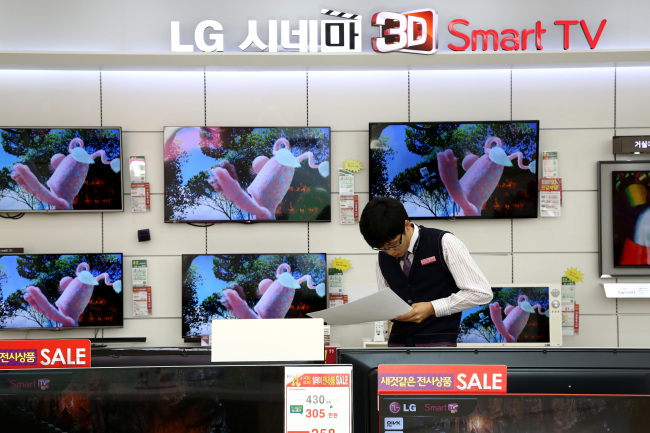LG Electronics, the world’s No. 2 TV maker, is expected to mass produce glasses-free 3-D TVs by 2017, much later than the government’s initial commercialization plan.
“It will take at least three years, given the current level of technology,” said Bang Young-woon, the head of LG Electronics’ TV products and planning division after a UHD conference last Thursday.
 |
An employee works in front of LG Electronics’ Cinema 3-D televisions in Seoul. (Bloomberg) |
He added that the glasses-free 3-D TVs on the market cannot be called fully glasses-free as they offer 3-D vision only when viewed straight on.
The government has invested 198 billion won ($183 million) in smart media including smart TVs and glasses-free 3-D TVs since 2011, hoping to see mass production by 2015.
“The government projects to support relevant technologies including codec, compression and a platform network are almost done, but improving the display technology seems to be taking longer,” said Shin Jong-sik, a government official at the Ministry of Science, ICT and Future Planning’s radio policy planning division.
Yoo Jong-woo, an analyst at Korea Investment & Securities also said, “Much higher resolution technology is needed to realize glasses-free 3-D TVs.”
In order to see conventional 3-D content with glasses-free TVs, additional shifting technologies are necessary.
The technology for shifting 3-D media content to glasses-free 3-D TVs is equivalent to the price of the TV, meaning prices also need to come down to attract customers, according to Shin.
Also, 3-D content is scarce due to the lack of a value chain to support production.
Bang said LG Electronics is currently developing technology to transition 2-D content into 3-D.
At the international CES 2011 in Las Vegas, LG Electronics, Sony and Toshiba unveiled glasses-free 3-D TVs for the first time in a bid to respond to Samsung Electronics’ dominant market share of 3-D TVs.
However, interest in 3-D televisions has waned with slow technological development, and in the face of the growing popularity of ultrahigh-definition TVs.
By Shin Ji-hye (
shinjh@heraldcorp.com)








